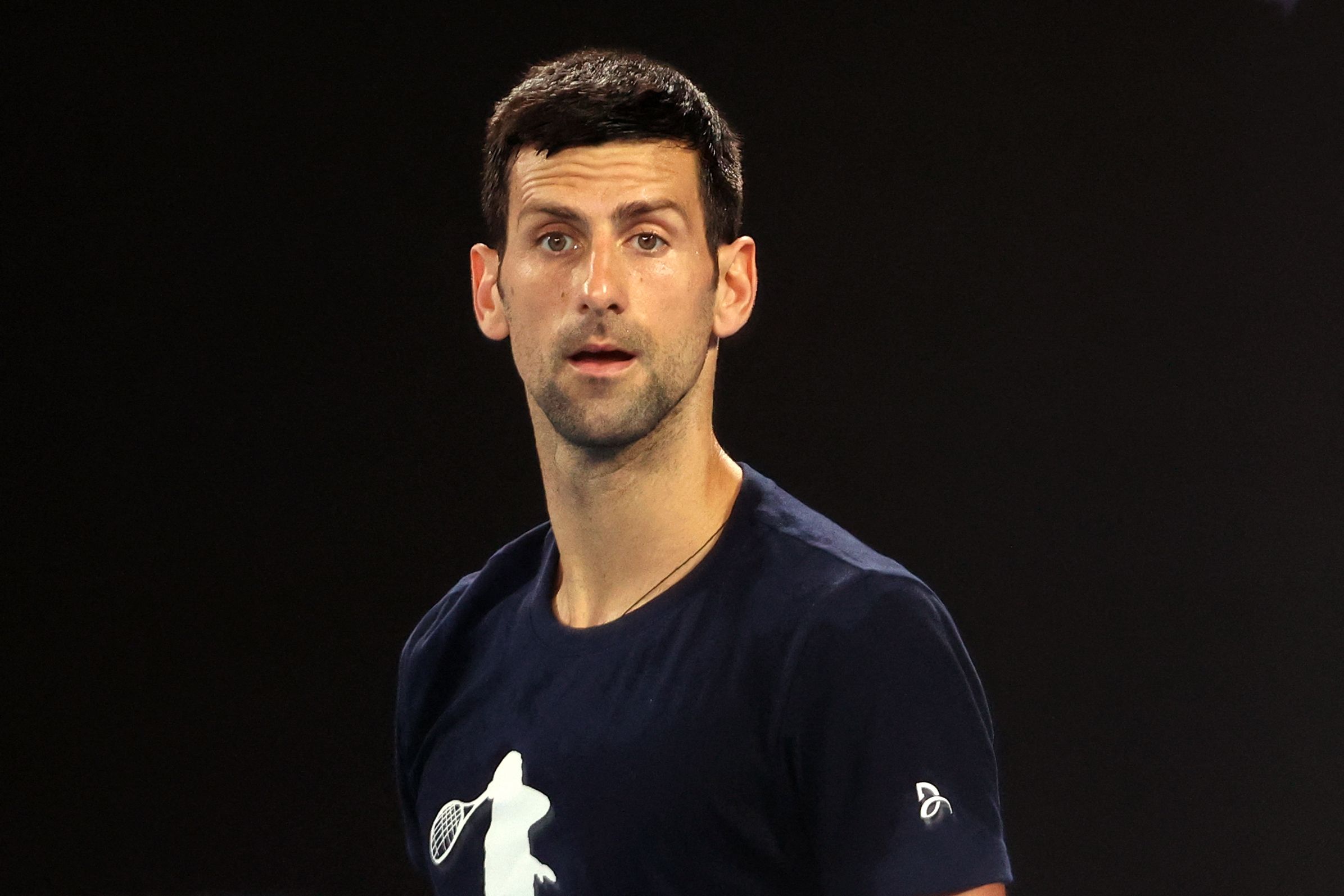Tennis: Australian federal court upholds cancellation of Djokovic's visa
Sign up now: Get ST's newsletters delivered to your inbox

A medical exemption that allowed Novak Djokovic to enter Australia without being vaccinated sparked fury in the country.
PHOTO: AFP
Follow topic:
MELBOURNE (REUTERS, AFP) - An Australian court upheld a government decision to cancel Novak Djokovic's visa on Sunday (Jan 16), ending a sensational 11-day battle over his Covid-19 vaccination status and dashing his dream of a record 21st Grand Slam.
In a few dry words, the chief justice of Australia’s Federal Court, James Allsop, dispensed with the unvaccinated tennis superstar’s attempt to reinstate his cancelled visa.
“The orders of the court are that the amended application be dismissed with costs”, Allsop said announcing the unanimous decision, on the eve of the first matches at the Australian Open.
Djokovic said in a statement that he was “extremely disappointed” with the decision to cancel his visa to enter Australia, but would respect it and cooperate with the authorities in relation to his departure from the country.
The Serb said he hoped the focus would now return to tennis and the Australian Open Grand Slam, which starts in Melbourne on Monday (Jan 17).
The Serb said he hoped the focus would now return to tennis and the Australian Open Grand Slam, which starts in Melbourne on Monday (Jan 17).
The 34-year-old defending champion and first seed had been scheduled to play in the evening of the first day. If he had retained the title, he would become the first men’s tennis player in history to win 21 Grand Slams.
Instead, the openly anti-Covid vaccine athlete is now set to be kept in detention pending a quick flight out of Australia.
A medical exemption that allowed the Serbian tennis world No. 1 to enter the country without being vaccinated had sparked fury in Australia, and became a political issue for Prime Minister Scott Morrison, who has to call a federal election before May.
Three Federal Court justices had listened to a half day of feisty legal back-and-forth that argued whether Djokovic’s continued presence risked whipping up anti-vaccination sentiment during Australia's worst outbreak of Covid-19 since the pandemic began.
Immigration Minister Alex Hawke said Djokovic’s stance may inspire anti-vaccine sentiment, leading some people to face the pandemic without vaccination and inspiring anti-vaxxer activists to gather in protests and rallies.
The player’s high-powered legal team had painted Australia’s effort to deport him as “irrational” and “unreasonable”, but at times they faced pointed questions from the panel of three justices who will now decide the case.
His lawyer Nick Wood sought to systematically dismantle the government’s central argument. Despite the Serbian star being unvaccinated, Wood insisted his client had not courted anti-vaxxer support and was not associated with the movement.
The government “doesn’t know what Mr Djokovic’s current views are”, Wood insisted.
Djokovic has spent much of the last week in immigration detention, with his visa twice being revoked by the government over his refusal to get a Covid-19 vaccine before arrival – a requirement for most visitors.
Government lawyer Stephen Lloyd said the fact Djokovic was not vaccinated two years into the pandemic and had repeatedly ignored safety measures – including failing to isolate while Covid-19 positive – was evidence enough of his anti-vaccine views.
“He has now become an icon for the anti-vaccination groups,” Lloyd said. “Rightly or wrongly he is perceived to endorse an anti-vaccination view and his presence here is seen to contribute to that.”

<p>Protesters gather outside a government detention centre where Serbia's tennis champion Novak Djokovic is reported to be staying in Melbourne on January 8, 2022, as Djokovic thanked people "around the world" for their support since he was dramatically refused entry to Australia over his Covid-19 vaccine status. (Photo by William WEST / AFP)</p>
PHOTO: AFP
In a written submission, the government also pointed out that Djokovic chose not to give evidence at the hearing.
“He could set the record straight if it needed correcting. He has not – that has important consequences.”
Because of the format of the court, the justices’ decision will be extremely difficult to appeal by either side. Besides immediate deportation, the Serbian star also faces a three-year ban from Australia.
Scott Morrison’s government had tried and failed to remove Djokovic once before – on the grounds he was unvaccinated and that a recent Covid infection was not sufficient for a medical exemption.
A lower circuit court judge ruled that officials at Melbourne airport made procedural errors when cancelling his visa. For a few days, Djokovic was free to train before a second visa revocation and a return to a notorious Melbourne immigration detention facility.
Many Australians – who have suffered prolonged lockdowns and border restrictions – believe the player gamed the system to dodge vaccine entry requirements.
The case has been seized on by culture warriors in the roiling debate over vaccines and how to handle the pandemic.
Australia’s immigration minister has admitted that Djokovic is at “negligible” risk of infecting Australians, but argued his past “disregard” for Covid-19 regulations may pose a risk to public health and encourage people to ignore pandemic rules.
The tennis ace contracted Covid-19 in mid-December and, according to his own account, failed to isolate despite knowing he was positive. Public records show he attended a stamp unveiling, a youth tennis event, and granted a media interview around the time he got tested and his latest infection was confirmed.
Djokovic is tied with Roger Federer and Rafael Nadal with 20 Grand Slam titles each. Spanish great Nadal took a swipe at his rival on Saturday as players complained the scandal was overshadowing the opening Grand Slam of the year.
“The Australian Open is much more important than any player,” Nadal told reporters at Melbourne Park. “The Australian Open will be a great Australian Open with or without him.”

